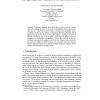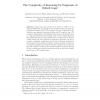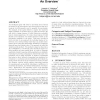89 search results - page 2 / 18 » Belief functions and default reasoning |
IJCAI
1993
13 years 6 months ago
1993
We describe a new approach to default reasoning, based on a principle of indi erence among possible worlds. We interpret default rules as extreme statistical statements, thus obta...
AI
2002
Springer
13 years 5 months ago
2002
Springer
We present different constructions for non-prioritized belief revision, that is, belief changes in which the input sentences are not always accepted. First, we present the concept...
ECSQARU
2007
Springer
13 years 11 months ago
2007
Springer
Traditional Dempster Shafer belief theory does not provide a simple method for judging the effect of statistical and probabilistic data on belief functions and vice versa. This put...
SAT
2009
Springer
13 years 12 months ago
2009
Springer
Default logic was introduced by Reiter in 1980. In 1992, Gottlob classified the complexity of the extension existence problem for propositional default logic as Σp 2-complete, an...
PODS
2006
ACM
14 years 5 months ago
2006
ACM
An intelligent agent will often be uncertain about various properties of its environment, and when acting in that environment it will frequently need to quantify its uncertainty. ...



